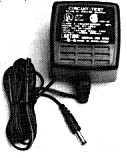Global WarmingOne wart at a time Plans for a new set of protocols governing internet addressing give
us an idea of what technicians believe the future may be like.
Their estimates are discussed as follows:
Plans for a new set of protocols governing internet addressing give
us an idea of what technicians believe the future may be like.
Their estimates are discussed as follows:
The working assumption of a hundred computers per human being was given a safety margin, and the final estimate to be used in developing an addressing specification was 1 quadrillion (1015) computers connected by 1 trillion (1012) networks. The designers took into account the inefficiencies in address assignment and came to the conclusion that new addresses should be somewhere between 57 and 68 bits in size. SourceA network, in 1999, requires some sort of electrical device, such as a hub, to coordinate traffic from various computers, printers etc. This can of course change--perhaps we will soon see solar powered hubs, or thermally powered routers--but at present the numbers point to a tremendous amount of electrical consumption. Where would it come from? Routers often come with little 'wall wart' appendages that convert the local electricity standard (220V or 110V) to a common voltage. Already in my home, there are a half dozen of these little heat-producing devices. The problem with them is that they do not stop using energy when they are not being used; they're always warm, and so they're always using electricity. The economics of producing electrically powered devices,-- the need to bring them to market quickly, and to avoid lengthy Underwriter's Laboratory (UL) approval procedures leads most engineers to opt for an external wall wart power supply. Nevermind that there is a power supply in each computer sold, and that many of the new devices are peripherals for some central computer or television. The concern with power conservation is a distant consideration. But should a trillion networks emerge, there really is no way the electricity can be generated without some drastic realignment of existing power production procedures. In France, where nuclear energy has yet to lose favor in circles of influence, the fact that no reasonably effective means of dealing with nuclear discharge has been found seems to be forgotten. Reasonable public discourse on the topics seems to be that nuclear is the only rational direction to proceed. The French media is complicit in the lack of dissenting voices that are heard on the matter. Likewise in the U.S., the NYTimes and the nuclear broadcasting company (NBC is owned by GE) under-report the dangers of nuclear power. This was in evidence in the 1997 cover-up of the dangers posed by the Cassini probe, carrying its 72Lb. of Plutonium. And it is evident in the scant attention given to things like the recent (Sept. 1999) plant shutdown at Indian Point nuclear reactor in Peekskill, New York. The cult of unlimited electrical consumption needs to be challenged in the centers of post-industrial excess. During the summer of 1999, New York's Consolidated Edison power company could not keep up with all the air conditioners--a brown out was inevitable, and so a section of the city was shut down. (It happened to be a largely black and hispanic neighborhood, and legal measures have ensued charging racism.) The fact that a public campaign to limit electrical use was not carried out with any convincing conviction reflects the lack of concern for environmental conservation. Consumers were not to be bothered with turning off unused appliances, a habit that could lead to diminished profits for the Con Edison company. Rather, temporary, stop-gap measures were implemented that tend to continue the magical unreality of cheap electrical supply -- "cheap" only if the costs to the environment are not factored. While latent electricity usage may not be the greatest cause of global warming, there are myriad poorly performing devices that are not being scrutinized sufficiently. The fact that computer CPU chips are advertised and promoted almost exclusively on the basis of their speed is another example of how the public is diverted from consideration of electrical, and consequently, fossil fuel usage. How much coal must be mined and nuclear waste left rotting in steel drums? How much energy is needed to drive 1 trillion wall-wart transformers that are never unplugged? Let alone the quadrillion computers. Probably efforts have been mis-focused with respect to global warming. Instead of relying on politicians to sign treaties that are subsequently ignored, it would be more effective for consumers to demand efficient products. |
More on Electrical leakage